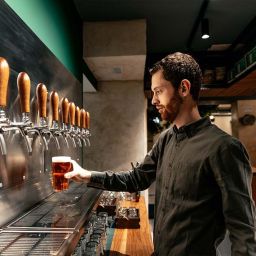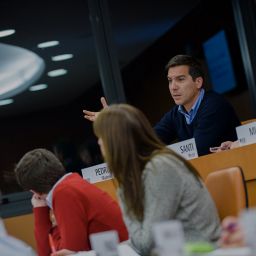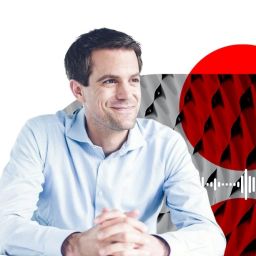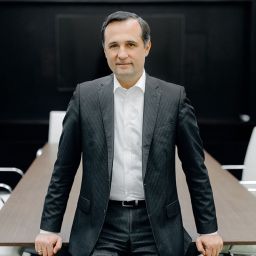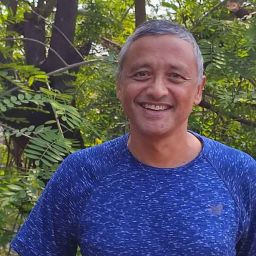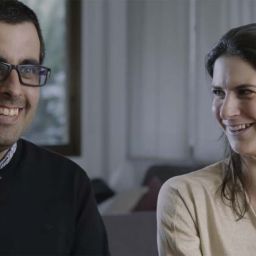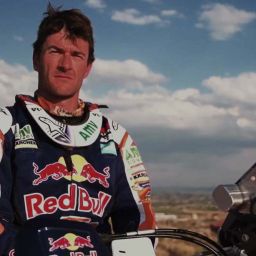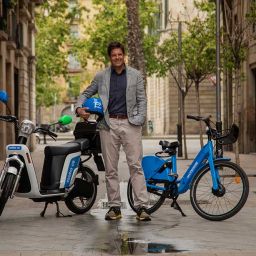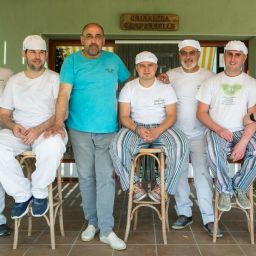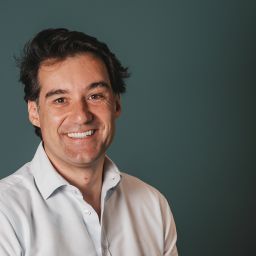Ousman Umar, Co-founder & President of NASCO Feeding Minds, wants migrants to be seen for what they are capable of — and prevent boat-crossing tragedies by empowering young people in Ghana through education.
Many successful entrepreneurs hold up their experiences as an example to others. The implication is that if you act as they do, you, too, will accomplish your dreams. Ousman Umar (IESE Executive MBA 2024) is different. The co-founder and president of the NGO, NASCO Feeding Minds, feels just the opposite. The purpose of his work is to prevent others from having to act as he did.
As a child, Umar traveled alone from Ghana to Spain, a journey that encompassed many years of disasters and false starts. He crossed part of the Sahara desert on foot and the Mediterranean in a boat he had built himself. It is a story of success at great cost.
He saw many people die, including his best friend. After his convoy was abandoned by traffickers in the desert, only six of some 50 people survived the journey on foot. Umar survived when he happened upon a dead man who still had a canteen with some water left in it. Later, Umar, a non-swimmer, survived a capsized boat on his first attempt to cross the Mediterranean; on his second, two boats set out and it was the other one that sank.
The makeshift dinghy carried him to Europe, colliding with the rocks of Fuerteventura. He had reached the promised land, but he soon found it less than promising. He says he suffered in a center for migrants before he finally arrived in Barcelona at the age of 16, homeless and uneducated.
A stroke of luck and empathy brought him to the attention of a local family, who ultimately took him in. He worked for his high-school diploma, then studied chemistry at university.
Now, Umar hopes other African children can avoid the experiences of his early years. NASCO Feeding Minds riffs on the idea of teaching a man to fish. In this case, Umar advocates for feeding children’s minds rather than giving them handouts. NASCO teaches coding and programming skills to children in Ghana to help build their earning potential and equip them for a life at home, so they don’t have to embark on the same high-risk journey to Europe like he did.
NASCO launched in 2012 from the personal savings of Umar and his friends. They bought 45 computers and got to work. Today, tens of thousands of children have passed through their classes in Ghana.
“Our hope,” he says, “is that by attacking the problem at the source, we can avoid today’s children becoming the migrants of tomorrow.”
Lost and found
Upon arriving on the streets of Barcelona, Umar recalls his profound frustration of feeling invisible to people around him. “I would ask for help and no one would look me in the face.” When he reached out to people to get their attention, he encountered fear: “It was as though I wasn’t human.”
There was one notable exception: the woman who ended up becoming his guardian. This changed the course of his life. It still astonishes him.
By that point in his life, he had experienced years of neglect. He wryly remarks that his first real degrees were hard-earned as a child laborer in Accra, where his welding job in the shipyards paid him only enough for a single bowl of rice a day, and then during his long unaccompanied journey north.
But luck, fate, grace even — call it what you will — intervened: “They are decisive in the life and career of any person,” he says. “Merit, effort and commitment are not the only pillars of success. Successful entrepreneurs and managers are also lucky people.”
And this moment of pure empathy and care, in which he was allowed to be visible in another person’s eyes, marked a turning point.
Education is essential
“Africans leave our countries and come to Europe because of a lack of information, a lack of training and a lack of opportunities. And we will continue to come as long as we don’t get those things where we live,” Umar says. “I speak from my own experience.”
The effort to succeed in life was by no means over once he was established in Spain. He has studied relentlessly, adding a marketing degree and a master’s in managing NGOs to his earlier studies. And with over 10 years’ experience heading NASCO under his belt, he now feels prepared for “the emotional and academic equivalent of climbing Mt. Everest” — the two-year Executive MBA at IESE that he is currently completing.
His hopes for the future are to revolutionize how humanitarian aid is managed. He agrees with the economist Dambisa Moyo that the kind of aid the West provides to Africa is deeply flawed, creating dependence while failing to resolve underlying problems. Aid from Europe is also often weaponized, tied to arbitrary policies to reduce illegal migration. Umar himself experienced this, when traffickers took him to Mali rather than Europe to benefit from migration-prevention schemes.
Umar sees no end to migrant crises, either through traditional aid or tougher border policies. Instead, “the time has come to feed minds and scale up initiatives like ours, which aspire to solve the problem of forced migration right at the source.”
And it’s not just about preventing further tragedies like those that he experienced. The man who was once invisible now wants to bring visibility to the ingenuity and skill of his people.
“When I was a child in rural Ghana,” he says, “I saw an airplane and I was told that white men make such things. I now know that talent has no color. I want to show the world that, with training and opportunities, Africans are capable of innovating just like Silicon Valley.”
This is Real leadership. It’s about helping people to work together toward greater goals, improving themselves along the way. It’s about seeing problems from different perspectives and knowing that even small decisions can have a big impact. It’s about learning from the best and having the humility to relearn every day.
Ousman Umar’s story inspires food for thought…
- Do you see the human being where others only see threat and fear?
- How do you effectively communicate and connect with others on a human level despite language and cultural barriers?
- When confronted with a desperate social need, do you jump in to try to help?
- Is a different world possible? Instead of looking away, do you seek to get involved instead?



